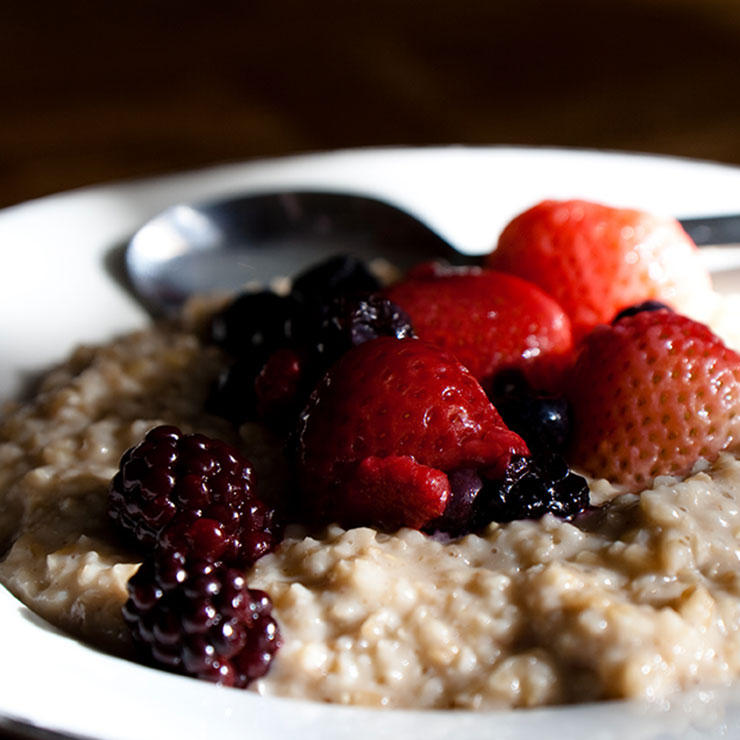Late Nights Give You the Munchies
When your circadian rhythms are disturbed, your body is more likely to secrete excess ghrelin, the hormone that increases appetite, which could cause weight gain and increase your risk of type 2 diabetes, says lead study author Yanping Li, MD, PhD, a research scientist at the Harvard T.H. Chan School of Public Health. Plus, not catching enough beauty sleep decreases your levels of leptin, the feel-full hormone.
Another factor that makes groggy people prone to putting on pounds is a total mind eff. Previous research from the University of California, Berkeley found that sleep deprivation makes activity in the brain's reward center light up like Vegas when we down indulgent treats, like bacon-wrapped anything. One Mayo Clinic study even found that when people cut 80 minutes from their regular sleep schedule, they wound up noshing on an average of 549 extra calories the next day.
Crappy Sleep Stresses You Out
But it's not just fatigue-driven trips down the candy aisle that trigger weight gain. In one University of Chicago–led study, researchers found that people who got 8.5 hours of sleep a night lost about twice as much fat as those who slept 5.5 hours per night—despite the fact that they all ate the same number of calories per day.
So why does an extra 3 hours of sleep seem to be fat-burning magic? Li notes that recent studies suggest that sleep problems ramp up levels of the stress hormone cortisol, which can lead to inflammation and insulin problems. Both of those issues can result in weight gain. In fact, one study published in the journal Diabetologia found that just 4 days of sleep deprivation make the body less sensitive to insulin, increasing the risk for extra fat storage.
Sleeping Off Extra Weight Is (Kind Of) Possible
OK, so getting a solid night's sleep isn't the only thing you need for weight loss success, but it's a pretty big deal. "When approaching weight loss, I tell my patients to imagine a three-legged stool, each one representing diet, exercise, and sleep," says Alexandra Sowa, MD, a clinical instructor of medicine at Weill Cornell Medical College. "Without one of the legs, the whole effort will collapse." In other words, getting 9 glorious hours won't make up for slacking on your diet and ignoring the gym.
How to Actually Sleep Your Way to Weight Loss
So, yeah, sleeping is essential when it comes to hitting your weight loss goal or maintaining it. But you don't have to lose sleep over it. (Ha, sorry.) Follow these rules to improve your beauty sleep and eventually wake up lighter.
1. Shoot for 6.5 to 8.5 hours of sleep. In one Brigham Young University study, women who got between 6.5 hours and 8.5 hours of sleep had the smallest risk of fat gain.
2. Sleep at the same time. Every. Single. Night. When it comes to keeping your body fat on the DL, following a sleep sched is even more important than getting enough shuteye, according to the same study.
3. Turn down the thermostat. Sleeping in colder rooms (think 66.2°F) increases your levels of ready-to-burn brown fat, revs up your metabolism, and improves insulin sensitivity, per one Diabetes study.
4. Draw the blinds. Women who sleep in the darkest rooms are 21% less likely to be obese than those who sleep in the lightest rooms, according to a 2014 study published in the American Journal of Epidemiology.
5. Power down the gadgets. You've undoubtedly heard that blue light from your smartphone drains your body's levels of melatonin (the handy chemical that helps you doze off). But research from the University of Granada in Spain also shows that reduced melatonin levels increase weight gain. Sowa says to shut down all of your gadgets at least 30 minutes before bedtime.
6. Don't forget the other factors. Eating healthy and adding extra movement into your day are key components of dropping pounds.
The article How to Sleep Your Way to Weight Loss originally ran on WomensHealthMag.com.




